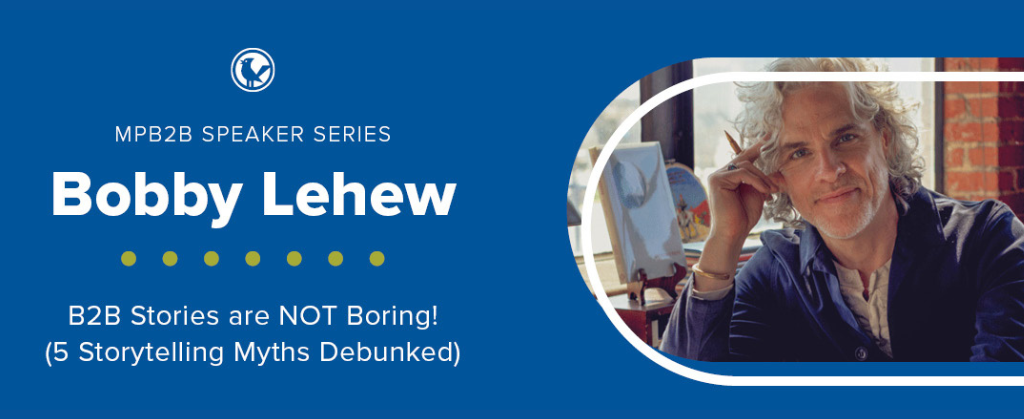
Humans love stories. They’re how we’ve passed along information for millions of years.
But too often, we think of B2B stories as boring. Something to be avoided, or minimized.
But that’s wrong, says Bobby Lehew, Chief Content Officer at commonsku. If our B2B stories are boring, it’s because we’re not doing it right.
In this excerpt from his 2022 presentation at B2B Forum, Bobby busts five myths around B2B storytelling and shares his ideas on creating powerful stories that help you connect with your prospects and customers.
Watch the video or read the transcript below.
Storytelling is actually a craft.
But we don’t think it’s a craft, because we’ve been telling stories since [we were young]. How many people would say they’re terrible at telling jokes? Raise your hands. Terrible at telling jokes.
You know that kid in school that was always funny all the time? You know why he was funny all the time? Because “funny” was a muscle he used to use… over and over and over and over again.
And it’s the same thing with story storytelling also, for us. It’s a heuristic. It’s a mental shortcut. It’s a bridge.
This is what I love to say about story: you can be an expert in the room with 20 years of engineering in your brain and you need the power and the channel of story more than the new person. But the new person can use the power in the channel of story as well.
But experts—especially all of you B2B experts who have been doing marketing for a while—really need [stories]. Because often we vomit details out on the desk, right through our pens, through our keyboards of what it is that we’re trying to sell, move, or intend.
One of my favorite examples is what George Steiner said about story and art. That it’s an “enunciation that breaks into the small house of our cautionary being.” (And that’s a little picture of Anne Hanley’s tiny house. So I thought we’d get an actual celebrity up on the screen!) An “enunciation that breaks…” What that means is, we have this cautionary attitude about ourselves. Story has a way of breaking through that, in such a gentle way.
We’re gonna unpack five storytelling myths. And here are the myths.
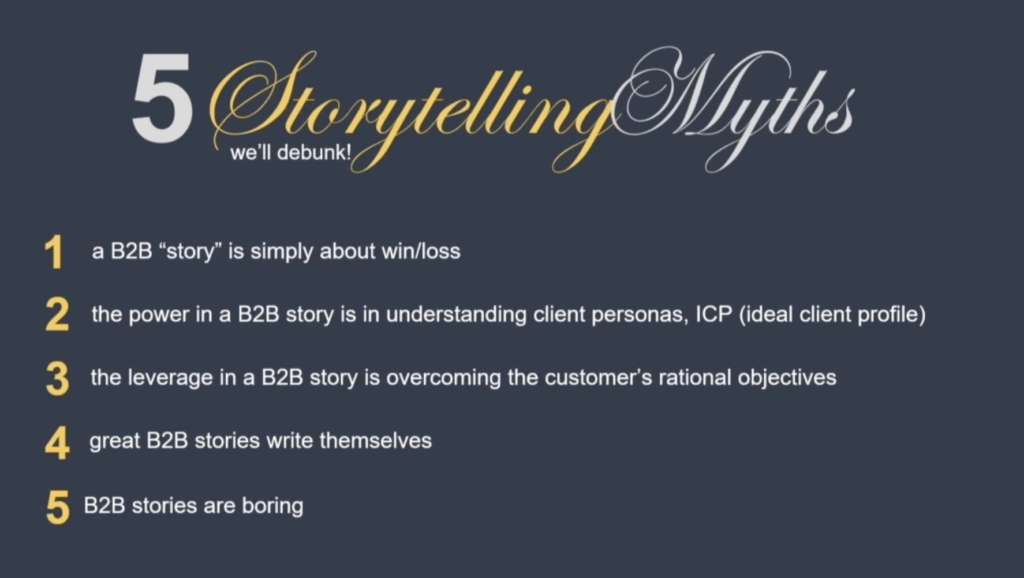
Number one, that storytelling or a B2B story is simply about win/loss.
Number two, that the power in a B2B story is in understanding client personas or the ICPs, the ideal client profile.
Number three, that the leverage in a B2B story is overcoming the customer’s rational objectives.
Another myth is the great B2B stories write themselves. A lot of smiles in the room because you already know that that’s probably not true based on how much sweat equity you pour into it.
Number five, B2B stories are boring.
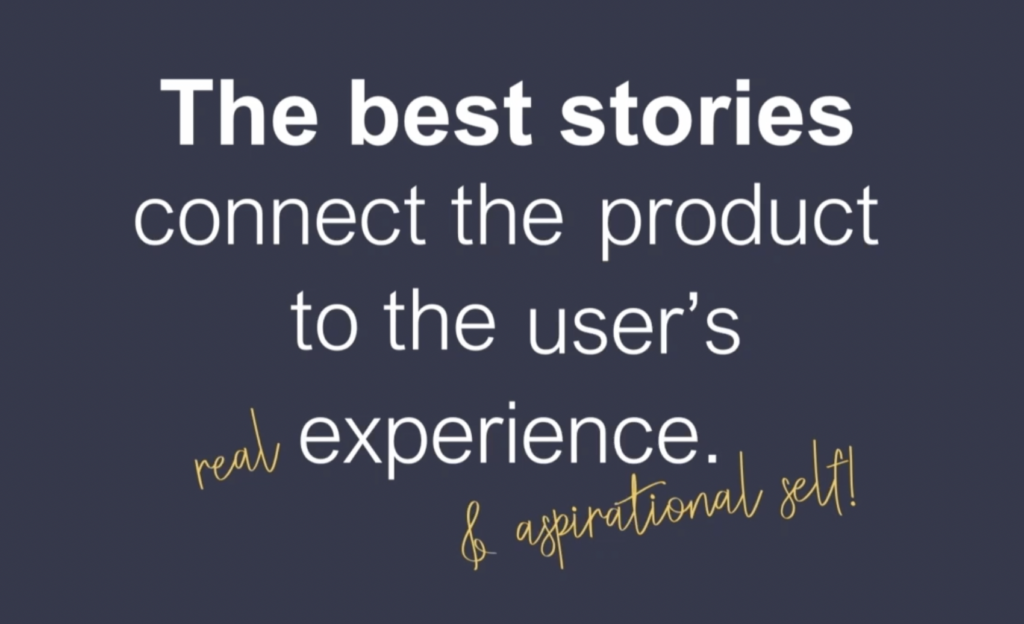
Okay, let’s start with number one. A B2B story is simply about helping customers win. Zander Nethercutt wrote a great article I encourage you to read later, called, “People don’t buy products, they buy better versions of themselves.” So the best stories connect the product to the user’s real experience, which sometimes means we have to be honest about whether or not that is gonna be a part of the struggle.
“I hear you, Mr. Customer, I hear you Ms. Customer. I know that this is a difficult decision to make. I understand you’re not afraid of change cuz I believe in you. I understand you’re afraid of the change. And I assure you, after we go through these three weeks, four weeks of implementation, you are not going to believe the transformation that’s going to occur.”
That’s part of our job. But part of our job today… is to acknowledge that middle part: connect the product to the user’s real experience and never forget their aspirational selves.
So myth busted: powerful storytelling is not simply about win/loss. It’s about revealing the transformation, okay?
Number two, the power of a B2B story is in understanding personas, or ICPs. Personas and ICPs are vitally important, but it’s the top of the funnel (to use language that B2B and marketers would get) top of the funnel for storytelling. We’re used to perspectives and point of views because we all process this very naturally.
Like I said, we’re naturally gifted storyteller, story receivers, and you process through first person, third person, second person, first person, plural. So we’re used to point of views and perspectives, but one of the things that I think we can do as B2B—and I think it’s a really honorable craft that we get to do this—is that we get to be asked the question, “where are our most authentic stories?”
The world’s ear is open to individualism, imperfect people, and unique voices. And I can’t emphasize imperfect people enough. Are there underrepresented points of your perspectives that you’ve not yet explored in your B2B stories? Because there’s a multiplicity of human beings and personalities and characters, if you will, like [Russian author Anton] Chekhov proved, with 8,000 characters that are that distinct.
Which is why, when we decide to tell a story about a small, underrepresented voice or group within our market sector, it is appealing to an incredible microcosm of humanity. I love this because, not far from where I’m at, some of you might have seen the show Reservation Dogs. It’s being filmed on a reservation not far from where I live. And I love this because the film is being filmed with an entirely indigenous cast, entirely indigenous crew. And if you haven’t heard any interviews with Sterling Hardge, I highly recommend it. But I love this because this is a perspective that we don’t have. This is what great storytelling is all about.
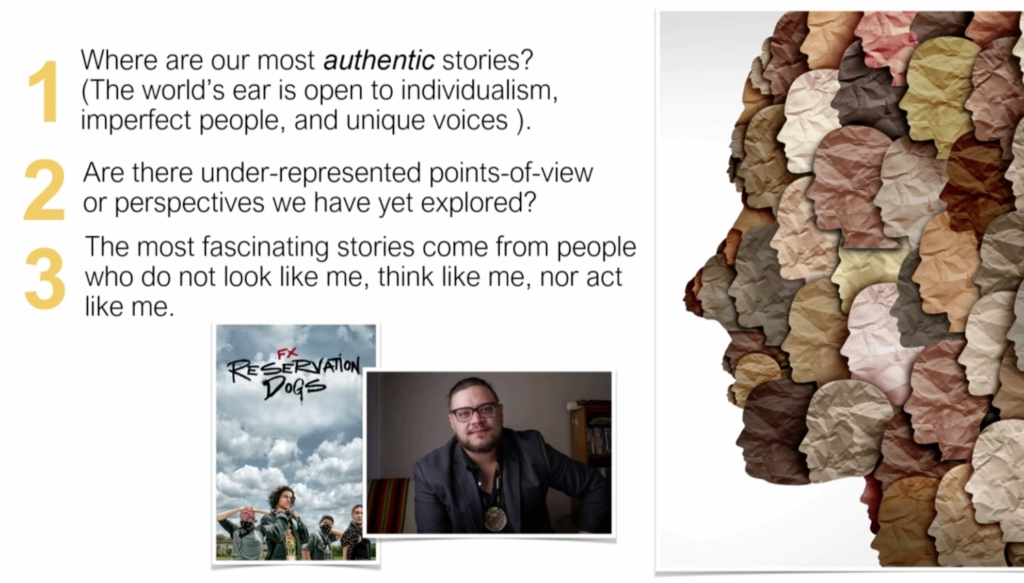
So a B2B story is actually about helping our customers become a better part of themselves, but also helping understand who they are as unique voices.
All right, myth number three. The leverage in a B2B story is an overcoming the customer’s rational objectives. This is my favorite one, because this is what we are really, really good at in B2B, is overcoming a customer’s rational objectives.
[Austrian philosopher Ludwig] Wittgenstein said, “the limits of my language are the limits of my world.”
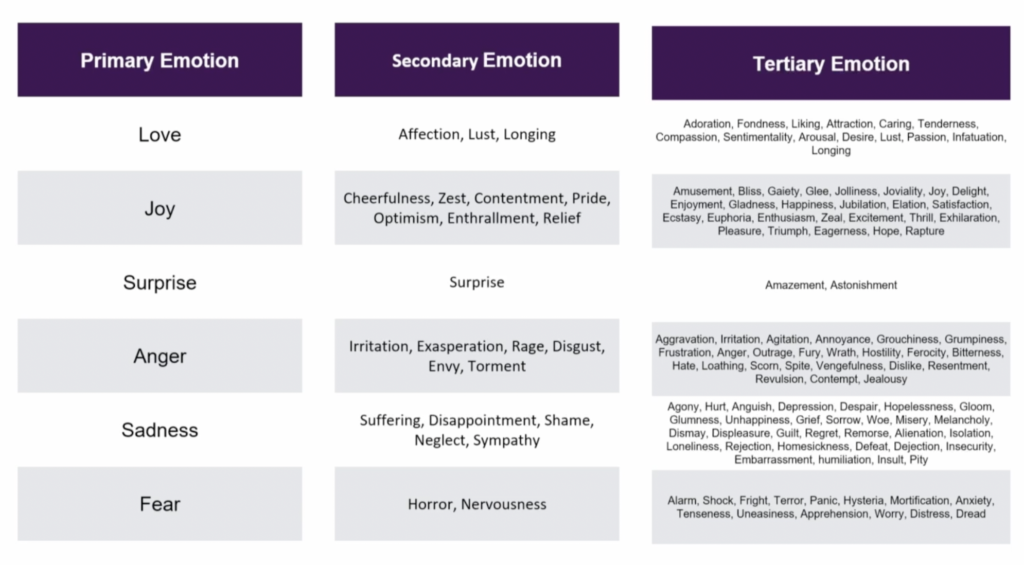
We are all familiar with the primary emotions of love, joy, surprise, anger, sadness, and fear. But there are secondary emotions and tertiary emotions. So the more we as marketers actually learn emotional language, the better off we’ll be.
In fact, when you look at what we do as marketers, everything we experience is emotion. When you interact with a logo, it’s all about emotion. It’s about how we feel or how that brand makes us feel.
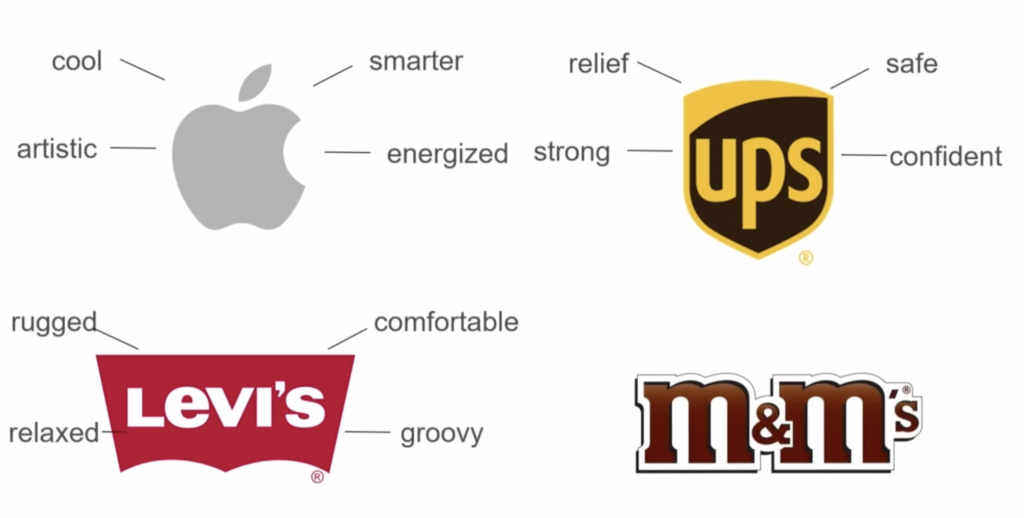
The leverage of a B2B story is not really in overcoming rational objectives, but in mapping the emotional journey. That’s actually how we create empathy. Everyone says, “have empathy,” but if we don’t understand the granularity of their emotional experience, we’re not going to be able to have empathy.
All right, myth number four: great B2B stories write themselves.
So storytelling is editing. Good storytellers are great editors in either pre-production, or post.
But one of the greatest skills I think we can develop as marketers is our interviewing skills, o unpack those stories.
I took some creative license and rewrote the title to Anne’s wonderful new book. And this is what she means by the whole book, by the way: that everybody re-writes.
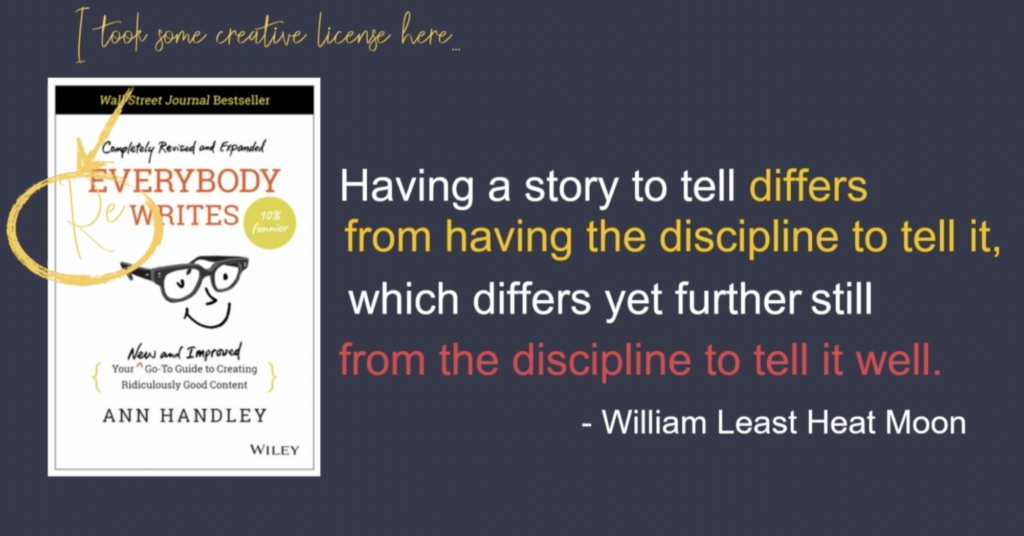
“Having a story to tell differs from having the discipline to tell it, which differs further still from the discipline to tell it well,” which is what William Least Heat Moon, one of my favorite indigenous authors, had to say.
Anne’s “think before you ink,” three questions before you start any story: Why? What? And, So What-Because…
We’re running through time. So here’s the last myth, but first: the truth is that great B2B stories don’t write themselves. Great B2B stories are either written, sometimes pre-written or pre discovered in our preparedness, or post.
Finally, B2B stories are boring. But Ann says, make the customer the hero of the story.
The truth is, B2B stories are not boring. They’re only boring when we talk about ourselves only.
When we dig down into the particulars of an individual’s experience is where we can discover the most magic. And it does take work. It does take a lot of work. And congratulations to many of you who are doing this.
So here are the five storytelling myths we debunked.
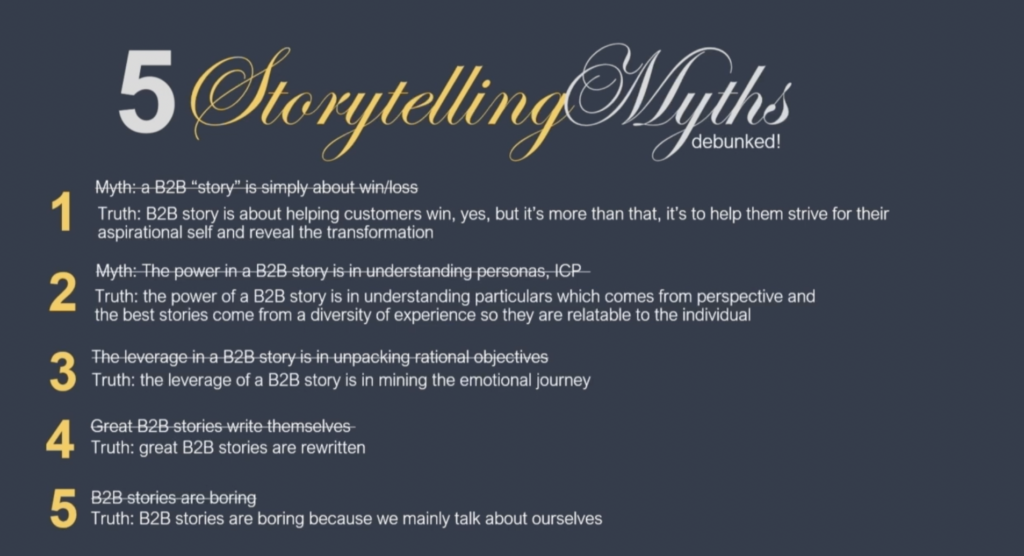
B2B story is about helping customers win, but it’s more than that. It’s helping them to strive for their aspirational self and reveal the transformation through our storytelling.
The power of a B2B story is in understanding particulars, which comes from perspective. And the best stories come from a diversity of experience, so they’re relatable to the individual. Not the persona, but the individual.
Number three, the leverage of a B2B story is in mining the emotional journey.
And number four, great B2B stories are not written, they’re rewritten.
And… they’re only boring because we mainly talk about ourselves.
Published 6/14/23
B2B Forum is packed with marketing insights, strategies, and tactics taken from the real world experience of over forty industry experts, packaged into context you can actually put to use.
Join us in Boston for B2B Forum 2024 this coming November 12-14, 2024. Early buyers get B2B Forum tickets at their lowest rate, and discounted hotel rooms are available while they last.